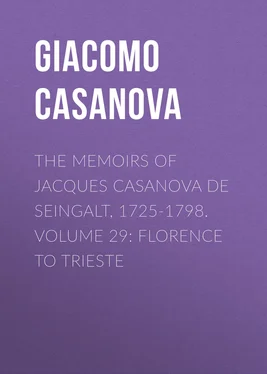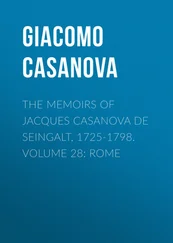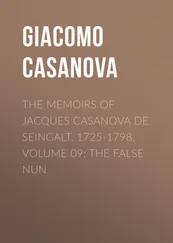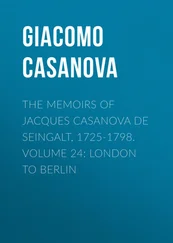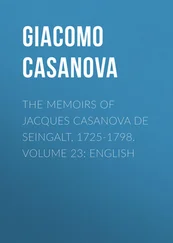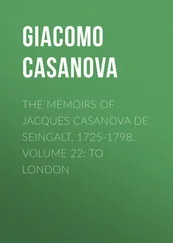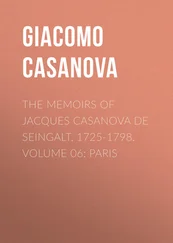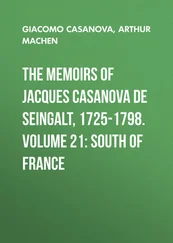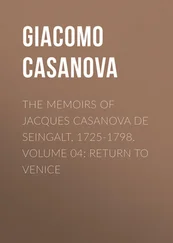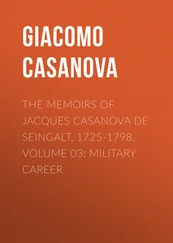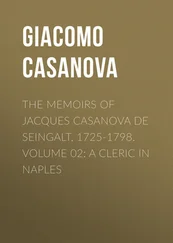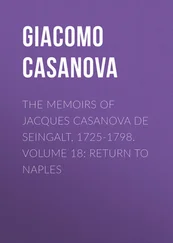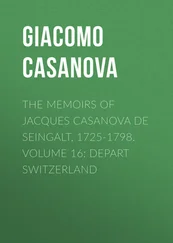Giacomo Casanova - The Memoirs of Jacques Casanova de Seingalt, 1725-1798. Volume 29 - Florence to Trieste
Здесь есть возможность читать онлайн «Giacomo Casanova - The Memoirs of Jacques Casanova de Seingalt, 1725-1798. Volume 29 - Florence to Trieste» — ознакомительный отрывок электронной книги совершенно бесплатно, а после прочтения отрывка купить полную версию. В некоторых случаях можно слушать аудио, скачать через торрент в формате fb2 и присутствует краткое содержание. Жанр: Биографии и Мемуары, История, foreign_edu, foreign_antique, foreign_prose, на английском языке. Описание произведения, (предисловие) а так же отзывы посетителей доступны на портале библиотеки ЛибКат.
- Название:The Memoirs of Jacques Casanova de Seingalt, 1725-1798. Volume 29: Florence to Trieste
- Автор:
- Жанр:
- Год:неизвестен
- ISBN:нет данных
- Рейтинг книги:3 / 5. Голосов: 1
-
Избранное:Добавить в избранное
- Отзывы:
-
Ваша оценка:
- 60
- 1
- 2
- 3
- 4
- 5
The Memoirs of Jacques Casanova de Seingalt, 1725-1798. Volume 29: Florence to Trieste: краткое содержание, описание и аннотация
Предлагаем к чтению аннотацию, описание, краткое содержание или предисловие (зависит от того, что написал сам автор книги «The Memoirs of Jacques Casanova de Seingalt, 1725-1798. Volume 29: Florence to Trieste»). Если вы не нашли необходимую информацию о книге — напишите в комментариях, мы постараемся отыскать её.
The Memoirs of Jacques Casanova de Seingalt, 1725-1798. Volume 29: Florence to Trieste — читать онлайн ознакомительный отрывок
Ниже представлен текст книги, разбитый по страницам. Система сохранения места последней прочитанной страницы, позволяет с удобством читать онлайн бесплатно книгу «The Memoirs of Jacques Casanova de Seingalt, 1725-1798. Volume 29: Florence to Trieste», без необходимости каждый раз заново искать на чём Вы остановились. Поставьте закладку, и сможете в любой момент перейти на страницу, на которой закончили чтение.
Интервал:
Закладка:
If reason and not prejudice had been consulted, the procedure would have been very different; for if relative impotence was considered a sufficient ground for divorce, of what use was the examination?
The marquis should have sworn that he could do nothing with his wife, and if the lady had traversed this statement the marquis might have challenged her to put him into the required condition.
But the destruction of old customs and old prejudices is often the work of long ages.
I felt curious to know this character, and wrote to M. Dandolo to get me a letter of introduction to the marquis.
In a week my good old friend sent me the desired letter. It was written by another Venetian, M. de Zaguri, an intimate friend of the marquis.
The letter was not sealed, so I read it. I was delighted; no one could have commended a person unknown to himself but the friend of a friend in a more delicate manner.
I thought myself bound to write a letter of thanks to M. Zaguri. I said that I desired to obtain my pardon more than ever after reading his letter, which made me long to go to Venice, and make the acquaintance of such a worthy nobleman.
I did not expect an answer, but I got one. M. Zaguri said that my desire was such a flattering one to himself, that he meant to do his best to obtain my recall.
The reader will see that he was successful, but not till after two years of continuous effort.
Albergati was away from Bologna at the time, but when he returned Severini let me know, and I called at the palace. The porter told me that his excellence (all the nobles are excellences at Bologna) had gone to his country house, where he meant to pass the whole of the spring.
In two or three days I drove out to his villa. I arrived at a charming mansion, and finding no one at the door I went upstairs, and entered a large room where a gentleman and an exceedingly pretty woman were just sitting down to dinner. The dishes had been brought in, and there were only two places laid.
I made a polite bow, and asked the gentleman if I had the honour of addressing the Marquis Albergati. He replied in the affirmative, whereupon I gave him my letter of introduction. He took it, read the superscription, and put it in his pocket, telling me I was very kind to have taken so much trouble, and that he would be sure to read it.
"It has been no trouble at all," I replied, "but I hope you will read the letter. It is written by M. de Zaguri, whom I asked to do me this service, as I have long desired to make your lordship's acquaintance."
His lordship smiled and said very pleasantly that he would read it after dinner, and would see what he could do for his friend Zaguri.
Our dialogue was over in a few seconds. Thinking him extremely rude I turned my back and went downstairs, arriving just in time to prevent the postillion taking out the horses. I promised him a double gratuity if he would take me to some village at hand, where he could bait his horses while I breakfasted.
Just as the postillion had got on horseback a servant came running up. He told me very politely that his excellence begged me to step upstairs.
I put my hand in my pocket and gave the man my card with my name and address, and telling him that that was what his master wanted, I ordered the postillion to drive off at a full gallop.
When we had gone half a league we stopped at a good inn, and then proceeded on our way back to Bologna.
The same day I wrote to M. de Zaguri, and described the welcome I had received at the hands of the marquis. I enclosed the letter in another to M. Dandolo, begging him to read it, and to send it on. I begged the noble Venetian to write to the marquis that having offended me grievously he must prepare to give me due satisfaction.
I laughed with all my heart next day when my landlady gave me a visiting card with the inscription, General the Marquis of Albeygati. She told me the marquis had called on me himself, and on hearing I was out had left his card.
I began to look upon the whole of his proceedings as pure gasconnade, only lacking the wit of the true Gascon. I determined to await M. Zaguri's reply before making up my mind as to the kind of satisfaction I should demand.
While I was inspecting the card, and wondering what right the marquis had to the title of general, Severini came in, and informed me that the marquis had been made a Knight of the Order of St. Stanislas by the King of Poland, who had also given him the style of royal chamberlain.
"Is he a general in the Polish service as well?" I asked.
"I really don't know."
"I understand it all," I said to myself. "In Poland a chamberlain has the rank of adjutant-general, and the marquis calls himself general. But general what? The adjective without a substantive is a mere cheat."
I saw my opportunity, and wrote a comic dialogue, which I had printed the next day. I made a present of the work to a bookseller, and in three or four days he sold out the whole edition at a bajocco apiece.
CHAPTER XIX
Farinello and the Electress Dowager of Saxony—Madame Slopitz—Nina—The Midwife—Madame Soavi—Abbe Bolini—Madame Viscioletta—The Seamstress—The Sorry Pleasure of Revenge—Severini Goes to Naples—My Departure—Marquis Mosca
Anyone who attacks a proud person in a comic vein is almost sure of success; the laugh is generally on his side.
I asked in my dialogue whether it was lawful for a provost-marshal to call himself simply marshal, and whether a lieutenant-colonel had a right to the title of colonel. I also asked whether the man who preferred titles of honour, for which he had paid in hard cash, to his ancient and legitimate rank, could pass for a sage.
Of course the marquis had to laugh at my dialogue, but he was called the general ever after. He had placed the royal arms of Poland over the gate of his palace, much to the amusement of Count Mischinski, the Polish ambassador to Berlin, who happened to be passing through Bologna at that time.
I told the Pole of my dispute with the mad marquis, and persuaded him to pay Albergati a visit, leaving his card. The ambassador did so, and the call was returned, but Albergati's cards no longer bore the title of general.
The Dowager Electress of Saxony having come to Bologna, I hastened to pay my respects to her. She had only come to see the famous castrato Farinello, who had left Madrid, and now lived at Bologna in great comfort. He placed a magnificent collation before the Electress, and sang a song of his own composition, accompanying himself on the piano. The Electress, who was an enthusiastic musician, embraced Farinello, exclaiming,—
"Now I can die happy."
Farinello, who was also known as the Chevalier Borschi had reigned, as it were, in Spain till the Parmese wife of Philip V. had laid plots which obliged him to leave the Court after the disgrace of Enunada. The Electress noticed a portrait of the queen, and spoke very highly of her, mentioning some circumstances which must have taken place in the reign of Ferdinand VI.
The famous musician burst into tears, and said that Queen Barbara was as good as Elizabeth of Parma was wicked.
Borschi might have been seventy when I saw him at Bologna. He was very rich and in the enjoyment of good health, and yet he was unhappy, continually shedding tears at the thought of Spain.
Ambition is a more powerful passion than avarice. Besides, Farinello had another reason for unhappiness.
He had a nephew who was the heir to all his wealth, whom he married to a noble Tuscan lady, hoping to found a titled family, though in an indirect kind of way. But this marriage was a torment to him, for in his impotent old age he was so unfortunate as to fall in love with his niece, and to become jealous of his nephew. Worse than all the lady grew to hate him, and Farinello had sent his nephew abroad, while he never allowed the wife to go out of his sight.
Читать дальшеИнтервал:
Закладка:
Похожие книги на «The Memoirs of Jacques Casanova de Seingalt, 1725-1798. Volume 29: Florence to Trieste»
Представляем Вашему вниманию похожие книги на «The Memoirs of Jacques Casanova de Seingalt, 1725-1798. Volume 29: Florence to Trieste» списком для выбора. Мы отобрали схожую по названию и смыслу литературу в надежде предоставить читателям больше вариантов отыскать новые, интересные, ещё непрочитанные произведения.
Обсуждение, отзывы о книге «The Memoirs of Jacques Casanova de Seingalt, 1725-1798. Volume 29: Florence to Trieste» и просто собственные мнения читателей. Оставьте ваши комментарии, напишите, что Вы думаете о произведении, его смысле или главных героях. Укажите что конкретно понравилось, а что нет, и почему Вы так считаете.
